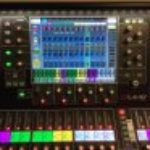Forums › Forums › dLive Forums › dLive troubleshooting › dLive Group Routing
Tagged: group to group, Groups., processing
- This topic has 17 replies, 6 voices, and was last updated 3 years, 9 months ago by
rikkord.
-
AuthorPosts
-
2020/04/23 at 3:09 pm #91287
Rupert
ParticipantI currently have a bunch of channels routing to groups then going to the mains (Kick, Toms, Cymbals, etc…) is there any want to route groups to groups? So all my individual drum groups would go to ONE drum group then from the one DRUM group to the mains?
2020/04/23 at 7:30 pm #91291 SteffenRParticipant
SteffenRParticipantno Grp to grp
this would add latency what is not wanted here2020/04/23 at 7:37 pm #91293 WolfgangParticipant
WolfgangParticipantYou could use a matrix for that.
This matrix you simply bring back into an input channel and send it directly to the Mains.
This gives you a lot of possibilities for equalization and dynamics.2020/04/23 at 7:47 pm #91295 SteffenRParticipant
SteffenRParticipantnever seen that bevor… interesting…
this makes some weird things possibleyou can use the ext. in of a group to feed the group with another group output
but this will destroy the phase coherency2020/04/23 at 9:27 pm #91298Rupert
ParticipantThe group to group = latency, makes sense.
The option that Wolfgang suggested would that cause any latency? How would I do this?
Would I route all my groups to the matrix first?
Also are there any plans to accommodate group to group in future updates?
2020/04/23 at 9:35 pm #91299 SteffenRParticipant
SteffenRParticipantmaybe they will implement it
but you can send the group out to a different group with the External In feature of mixes
and of course it will add latency
the matrix way suggested by @wolfgang is adding latency as well
the signal is passing the complete path through the processing and reentries after that at the first stage…2020/04/23 at 10:24 pm #91301Rupert
ParticipantLooks as though I might be able to achieve this by sending all the groups to an AUX then to a Matrix.
2020/04/24 at 8:46 am #91312 WolfgangParticipant
WolfgangParticipantMixing groups into a matrix and then into an input naturally means a bit more latency. But since all groups are sent into this matrix under the same conditions, the latency of all groups remains the same, so there are no comb filters.
The only important thing is that the input signals are not routed to the sum again!Why do you want to go via a matrix and an aux?
This is an additional bus and could mean additional latency.2020/04/24 at 5:56 pm #913242020/04/24 at 7:38 pm #91326Rupert
Participant@zistan so how would I go about doing this? If I have 5 groups (kick Gp, SnareGp, Toms Gp, Cymbals Gp,) and I want to bus them all to ONE Drums Gp how would I go about doing this using your method? Based on the others have posed its not possible unless I buss all these groups to a AUX then a matrix.
2020/04/24 at 10:28 pm #91328 WolfgangParticipant
WolfgangParticipantBased on the others have posed its not possible unless I buss all these groups to a AUX then a matrix.
No, you misunderstood me.
It is sufficient to send the subgroups into a matrix – and then send this matrix into a normal input.
You can then simply treat this matrix as your master subgroup.
An additional routing into an AUX is not necessary here.As Zisten writes, you can also get the groups back into an input channel one by one – and then send these inputs back into a new subgroup.
of course this is also possible.In my opinion, the way via a matrix is more elegant, because only one input is needed.
2020/04/25 at 12:54 pm #91345Zistan
Participant@Rupert, distance from snare to overheads is 20 times more than from snare to snare microphone. Do you align the phase between them? 😉 6 samples – is nothing, forget about them and work with pleasure. But you can always compensate for these delays, because this is done only once.
2020/04/25 at 1:43 pm #913482020/05/18 at 9:17 am #919192020/07/23 at 6:50 pm #93596Lhoer
ParticipantI agree with Wolfgang about the relevance of using a Matrix to route, in addition to being elegant, it is safer.
-
AuthorPosts
- You must be logged in to reply to this topic.